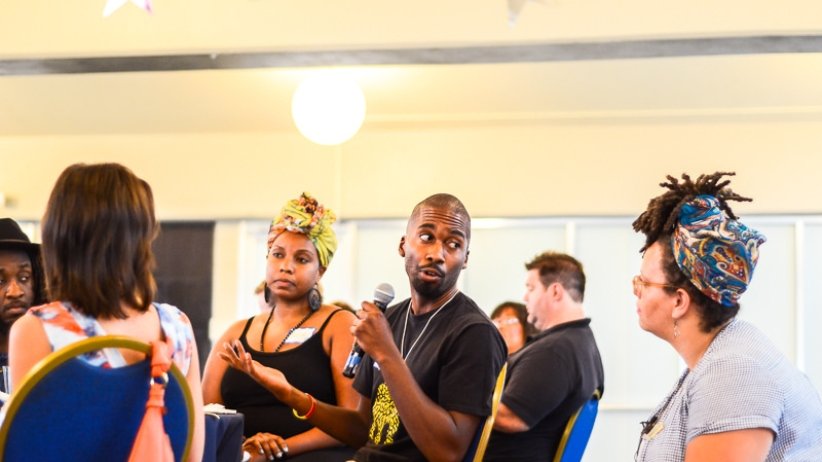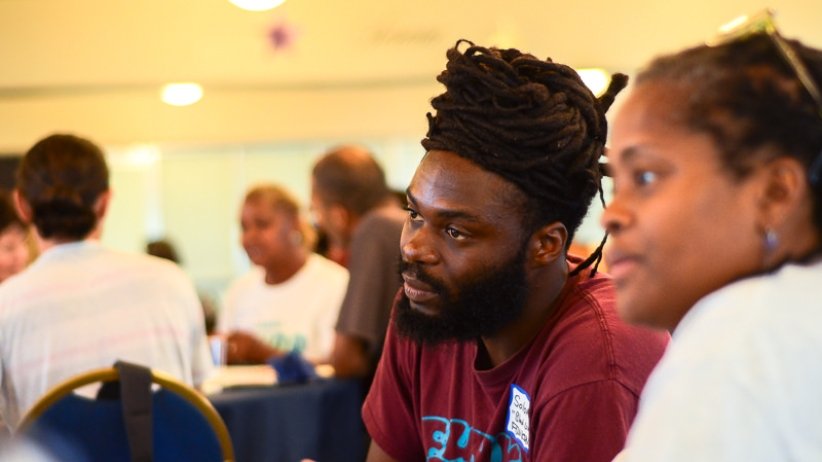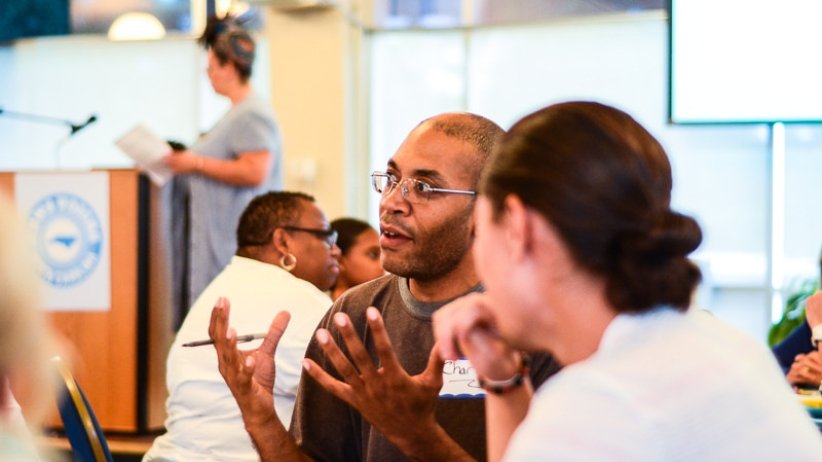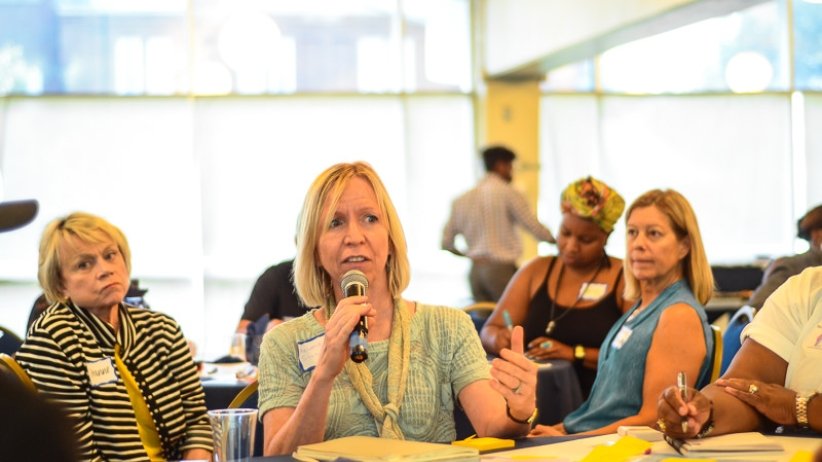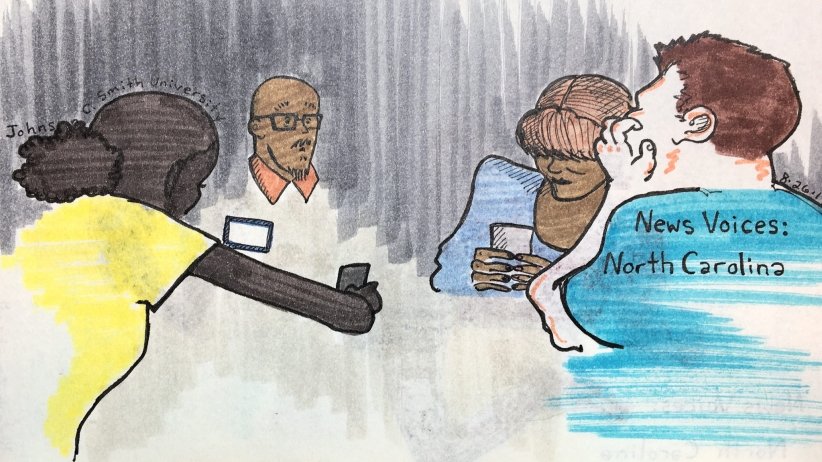Residents and Reporters Discuss Inequity in Charlotte
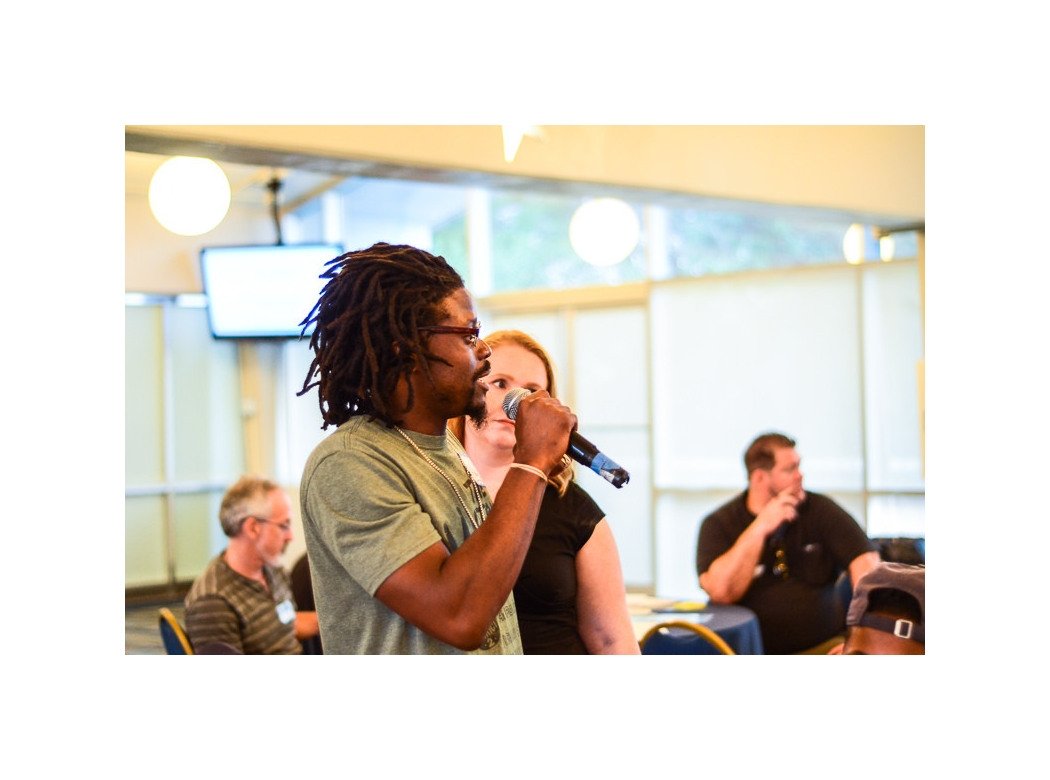
Jonathan Cooper
Telling the full story of inequity today requires a deep understanding of and reckoning with the past.
That was one of the clearest takeaways from “The News Charlotte Needs: A Public Forum on the Role of Journalism in Tackling Inequity,” held last Saturday. More than 80 people came together at Johnson C. Smith University to talk about how local news can address the city’s longstanding inequities.
The event was the largest gathering so far for News Voices: North Carolina, a project that invites the public to take part in conversations about the future of journalism so that news can be more responsive to community needs. The initiative also helps newsrooms across the state deepen local engagement, find new sources and broaden their audiences.
Excited to be at #newsvoicesnc today in Charlotte! pic.twitter.com/CcmFBYfxX6
— Teresa Gorman (@gteresa) August 26, 2017
People from many walks of life sat side by side: the city’s power players sat with college sophomores, community organizers sat with schoolteachers and hip-hop artists sat beside clergy.
There were reporters from the city’s major outlets, including the Charlotte Observer, WFAE public radio, Charlotte Magazine and Creative Loafing, as well as freelance documentary photographers, podcasters and activists who use social media.
Seen at #NewsVoicesNC at @JCSUniversity. pic.twitter.com/eiHrtjqE1G
— Elyse Dashew (@elysedashew) August 26, 2017
A city in flux
Free Press framed our forum around the ongoing conversation about economic mobility in Charlotte.
In 2013, a Harvard University study ranked Mecklenburg County last out of 50 major U.S. metros for economic mobility. Earlier this year, the Charlotte-Mecklenburg Opportunity Task Force released a report recommending changes across city and county institutions, but few have been implemented.
Saturday’s forum invited local residents, media makers, activists, artists and others to sit down with reporters and discuss the stories they think the city needs to move from talk to action.
“You’re our task force today,” said Alicia Bell, a Free Press organizer with the News Voices project and a Charlotte native.
In my role as director of the News Voices: North Carolina project, I then led a series of structured small-group conversations. Participants began by identifying issues that arose for them around inequality and economic mobility. These included homelessness, gentrification, public education, immigration, wages, over-policing, bias, White supremacy and the digital divide.
What quickly emerged was a sense that Charlotte’s struggles are rooted in its specific history and in the broader cultural history of racial discrimination and segregation.
“I’m tired of people asking me to forget the past,” one participant said. “I want us to recognize and rectify the past. Why would you have me ‘move forward’ instead of actually addressing the issues?”
Education came up frequently, particularly in the context of ongoing gentrification in Charlotte’s neighborhoods and in discussions of the central role public education plays in economic opportunity.
Charlotte-Mecklenberg Schools is the state’s largest school system and one of the largest in the United States, and it has been ground zero for the cycle of desegregation and resegregation that public schools across the country have seen in the decades since the Brown vs. Board of Education ruling. Several in attendance talked about CMS’ “golden age” in the ’70s and ’80s, when the system was highly integrated and highly diverse.
As one participant said, “That diversity strengthened me in a way that I will always carry with me wherever I go.”
People expressed a desire for more stories about development that connect the past and present.
They spoke of neighborhoods like Brooklyn, which urban renewal largely destroyed in the 1960s and ’70s, and where Marshall Park, a gathering place for protest, is slated for redevelopment. Some forum participants want to see stories of gentrification from the perspective of longtime residents, especially elders and people of color.
Other attendees want stories that explain the development process step by step in ways that could inform people who want to oppose gentrification.
Most of all, people asked for stories that center the lived experiences of people from all over the city, especially people struggling economically and those who are creating solutions in their schools, neighborhoods and community groups.
How journalism can cover inequity
Later, speakers we had invited shared their thoughts on the roles local news can play in addressing inequities.
Ju-Don Marshall, chief content officer at WFAE public radio, talked about how her station is using public forums and digital engagement to enable listeners to suggest story ideas and topics they want to see covered.
“It’s really important to us to reflect the needs of our community,” Marshall said. “The big initiative we’re pushing this year is really listening as part of our mission.”
Having spent many years in corporate positions, Patrice Funderburg launched a local organization called Educate to Engage last year.
The group uses a six-week study of Michelle Alexander’s book The New Jim Crow as the basis for reflection and education on White supremacy in the criminal justice system. A newcomer to activism, Funderburg said she’s become aware of how information flows for and about people affected by these issues.
“One thing we talked about at our table today is, what value is placed on certain narratives,” she said. “Power drives narratives in conversations in Charlotte. Well, I’m here to disrupt that.” She said it’s important to keep building coalitions among grassroots groups so they can have a stronger voice in public conversations.
Ryan Pitkin, news editor at the alt-weekly Creative Loafing Charlotte, talked about journalists’ role in covering inequity.
Last year, he wrote about Pedro Salmeron, a teenager Immigration and Customs Enforcement detained after he fled violence in El Salvador. Pitkin described sitting in the Charlotte living room of Salmeron’s mother and listening to her cry as she wondered if she would ever see her son again.
He recalled that a commenter on his article wrote, “‘See, this is the problem with you journalists. You always want to humanize these people instead of writing about the economic drain that they are.’”
Pitkin said, “My most important role is to humanize people going through something like this.”
He added that he joined Big Brothers Big Sisters to serve the community, and it ended up making him a better reporter. He’s become close to his little brother’s family, especially the boy’s single mother, who works in fast food.
Pitkin noted that many people in Charlotte who talk about the lack of economic mobility don’t experience those challenges, and as a journalist with a middle-class background, neither had he.
“For people who don’t actually experience that every day, [economic inequality] is becoming a cliché now in this city,” Pitkins said. “ So it’s important to know what that means, to wake up every day [when] you don’t have those opportunities.”
Solomon Tetteh, a hip-hop artist and member of Funk-shun Artist Collective, talked about the work he and other artists in Charlotte are doing to support kids in the community to express the good and bad they’re experiencing. Tetteh talked about the impact press attention has on artists and creative projects, its power to validate creative work and bring in new audiences.
“It doesn’t matter how good an artist is; if there’s no press, it does not happen,” he said.
In subsequent small-group discussions, people asked thoughtful questions, such as:
- What options do low-income families have for their children?
- How can we convince the parents moving into gentrifying neighborhoods to send their children to public schools?
- Who runs Charlotte? Who has the power?
- A number of questions were about the media itself, such as:
- What information would help people advocate for their needs, and how do we provide it?
- How does “if it bleeds, it leads” get shifted?
- How did news become so commercial and diluted?
- How do we determine what’s “newsworthy”?
- How do we shift the Black-and-White binary that frames news?
- How do we hold journalists accountable?
People asked for stories about immigrants in Charlotte, Muslim Americans, Native Americans and White people fighting racism. They asked for stories about what “affordable” means from the perspective of working families.
Reporters left with story ideas to pursue and people to contact. Many people expressed a desire for more public conversations about news, journalism and the way people across the city can have a greater voice in local coverage.
News Voices: North Carolina will continue to work with newsrooms and community groups across Charlotte and the state through 2018. Watch this space for more updates and announcements of future events.
“This event doesn’t end here. We will continued to build our movement in Charlotte” #NewsVoicesNC pic.twitter.com/JmBHhxKwmK
— O’neil (@pryceisright007) August 26, 2017
Check out some great photos and sketches from Saturday’s event:
